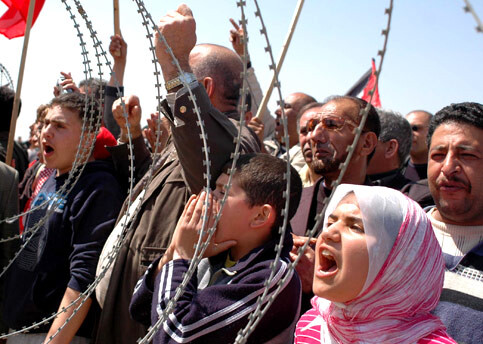Palestinian Campaign for the Academic and Cultural Boycott of Israel 16 April 2007

Palestinians take part in a demonstration at the entrance to Ras Atiya, south of Qalqilia, on the occasion of Land Day, 29 March 2007. (Khaleel Reash/MaanImages)
Statement by the Palestinian Campaign for the Academic and Cultural Boycott of Israel (PACBI) on Visits of International Delegations and Individuals to the OPT and Israel, 15 April 2007:
At a time when the international movement to isolate Israel is gaining ground in response to the escalation of Israel’s colonial and racist policies, we respectfully urge conscientious academics, artists and intellectuals from around the world, including those who visit the occupied Palestinian territory (OPT), to refrain from visiting Israel to participate in any event or encounter that is not explicitly dedicated to ending Israel’s illegal occupation and other forms of oppression. Regardless of intentions, such visits only contribute to the prolongation of injustice by normalizing and thereby legitimizing it, and inadvertently support Israel’s efforts to appear as a “normal” participant in the “civilized” world of science, scholarship and art while at the same time practicing a pernicious form of apartheid against Palestinians.
Visits to the OPT by international supporters and advocates of Palestinian rights have always been viewed by Palestinians as a source of encouragement and inspiration. These gestures of solidarity are very important to us; they help break down the walls of isolation imposed by Israel and the global centers of power, and also demonstrate to Israel and the world that the Palestinians are not alone in their struggle for freedom. However, a solidarity visit to the OPT should not be used as an occasion to give lectures at Israeli universities; organize performances, film screenings or exhibits in mainstream Israeli venues; collaborate in any way with Israeli artistic institutions; or participate in activities sponsored or supported — directly or indirectly — by the Israeli government or any of its agencies.
While many of our international supporters in the academic, artistic and intellectual community have heeded the Palestinian call for boycott, divestment, and sanctions (BDS) [1], supported by an overwhelming majority of Palestinian civil society, there may be those who are still uncertain about the criteria used to implement the boycott. We believe that relations with Israeli institutions that have not explicitly condemned occupation and oppression lend legitimacy to these institutions. Such institutions include all universities and major research institutions, as well as the vast majority of cultural and artistic organizations in Israel.
Palestinian calls for boycott of Israel — until it fully complies with its obligations under international law — are inspired by South African anti-apartheid appeals of the not-so-distant past. South African anti-apartheid leaders were among the first to expose the underlying common denominators between the two systems of racial discrimination, even arguing that Israel’s apartheid is in many ways worse than the one that existed in South Africa, as UN Special Rapporteur for human rights in the OPT, Prof. John Dugard, has stated. Indeed, Israel’s oppression of the Palestinians is three-tiered: military occupation of Gaza and the West Bank, including East Jerusalem, and the extensive colonization of the latter; denial of the UN-sanctioned rights of Palestinian refugees, including their right to return; and the system of racial discrimination against Palestinian citizens of Israel. This underlines the need for moral consistency from everyone who actively participated in the struggle against South African apartheid; we ask them to apply the same standards and not to make an exception for Israel.
The Palestinian Campaign for the Academic and Cultural Boycott of Israel was launched in Ramallah in April 2004 by a group of Palestinian academics and intellectuals to join the growing international boycott movement.
Related Links
End notes
[1] In July 2005, the first anniversary of the International Court of Justice’s ruling on the illegality of the Wall and the occupation regime, more than 170 Palestinian civil society unions and organizations issued the Call for BDS as a non-violent form of resisting Israel’s oppression. The Call issued by PACBI for academic and cultural boycott of Israel has also received widespread support from federations of academics, professionals, writers and artists, and from civil society organizations in Palestine. See:
http://www.pacbi.org/boycott_news_more.php?id=66_0_1_10_M11 and http://www.pacbi.org/campaign_statement.htm